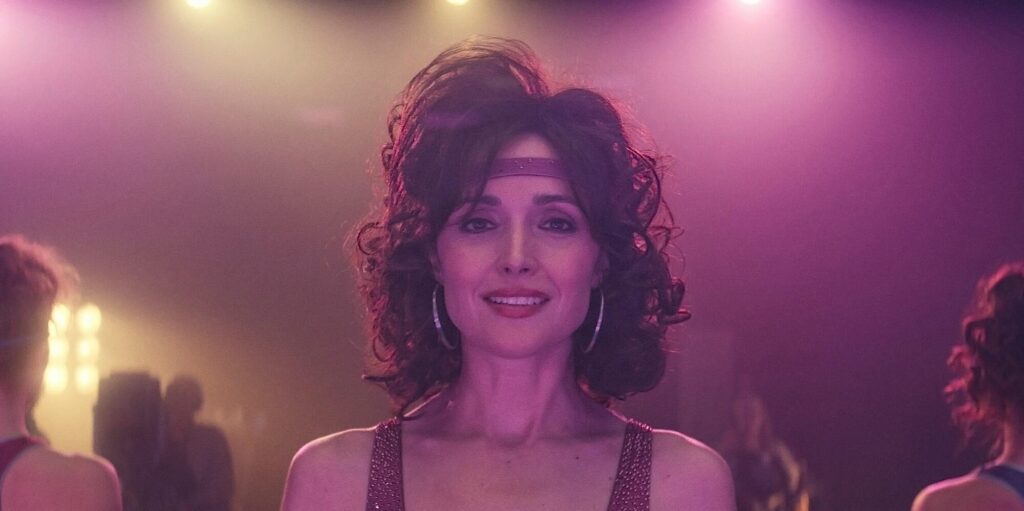Strong performances buoy Physical through its narrative shortcomings
Written by Ian Thomas Malone, Posted in Blog, Pop Culture, TV Reviews
The 1980s carry a certain mystique that only grows as time moves further and further on from the era. Beyond the sheer absurdity of the aerobics craze, where ridiculously slim people jazzercised in unison while decked out in thong leotards and neon leggings, lies a natural sense of intrigue to understand the zeitgeist of it all. “What the hell were they thinking,” exists not as a rhetorical question, but a legitimate point of entry for aerobics scholarship.
Apple TV+’s new series Physical follows the rise of Shelia (Rose Byrne), from misanthropic housewife to aerobics star. Stuck in a dead-end marriage with a burnout college professor Danny (Rory Scovel), Shelia initially copes with her monotonous existence by blowing off steam at ballet class, typically followed by a binge-eating & purge session of fast-food burgers in a hotel room.
It’s not until Danny decides to run for state assembly, no easy task for a socialist hippie in the Reagan-loving San Diego suburbs, that Shelia’s hotel bills start putting a strain on their already-shaky finances. Seeking a workout outlet following the closure of her ballet studio, Shelia discovers the aerobics studio run by Bunny (Della Saba) and her surfer bum boyfriend, Tyler (Lou Taylor Pucci). Needing money, Shelia quickly dominates Bunny’s orbit, occasionally also taking advantage of Greta (Dierde Friel), whose children attend the same preschool.
Byrne is mesmerizing in the lead role, her performance adding a much-needed layer of depth to Shelia’s fairly superficial personality. The first few episodes focus almost solely on Shelia, a dynamic that Byrne sells well with her cool approach to her character’s toxic home life. What works best about the early episodes is the way the show makes no apologies for its anti-hero who is severely lacking in the empathy department. Shelia is rotten in the way few women leads are ever allowed to be, making excellent television along the way.
The show does struggle with where to focus its attentions. The aerobics narrative often plays second fiddle to Danny’s campaign, an unfortunate allotment of screentime for the show’s worst character. Danny grows increasingly insufferable with the early-season addition of Jerry (Geoffrey Arend), a college buddy turned campaign manager. Though Shelia refers to Danny as the most brilliant man she’s ever met, Byrne puts no effort into selling the idea that her character ever looked at him with any degree of serious affection.
Likewise, the show hardly puts any effort into making Danny into anything resembling a sympathetic character. Shelia hides her aerobics interest from Danny, as well as the state of their dire finances, but the secrecy doesn’t really build toward any substantive narrative payoff. The show commits early on to Danny being an airheaded deadbeat, which sucks most of the air out of their slowly deteriorating relationship.
Pacing is a big problem for the second half of the ten-episode season. While the first few episodes are framed almost exclusively from Shelia’s point of view, the show gradually gives more focus to the supporting cast. Bunny and Greta see compelling storylines shortchanged at the expense of Danny. Working with limited screen time, Pucci quickly endears the audience to Tyler, an airhead with a heart of gold who works well opposite Shelia and Bunny.
More puzzling is the sudden emphasis midseason on John Breem (Paul Sparks), a real-estate developer/Republican mainstay who mostly acts as the face of Reagan conservatism in opposition to Danny’s dirtbag left aspirations. Sparks gives a predictably strong performance that’s essentially a riff on other prestige TV characters he’s played on shows like House of Cards and The Girlfriend Experience. Breem is much more compelling than Danny, but the show never really justifies why the character needed his own scenes with so much else going on.
Show creator Annie Weisman seems to struggle with how to frame Shelia’s attitude toward her family. Shelia goes from hardcore apathetic toward her husband and daughter early on, only to shift gears later on with little explanation. The show’s efforts to explore Shelia’s backstory fall a bit flat, coupled with the broader pacing problems of the second half of the season.
As a period piece, Physical is only mildly interested in exploring the politics and culture of the 1980s. There’s an early gaffe in the pilot where Danny remarks that Reagan had “just” been elected president, though the 1986 settings place the narrative 75% through his time in office. There is occasionally some interesting commentary on the nature of consumerism, but one might expect a bit more insight from a show that chose to place its political plotline at the center of the narrative.
Most disappointing is the show’s middling interest in what’s presented as its premise. Physical doesn’t have much to say about aerobics or what it is that drew people to such a seemingly absurd form of exercise. Weisman does highlight how the exercise could cater to body-obsessed people like Shelia, but the layers of spandex are hardly peeled back by the conclusion of the first season.
Byrne’s electric performance carries the show through its uneven pacing and sloppy narrative that spends way too much time highlighting the show’s worst character. Physical has the pieces of a great show. It’s beautifully shot and wonderfully acted for the most part. It is hard to shake the reality that the show that highlights a woman’s meteoric rise to aerobics fame was ill-advised to place such a heavy emphasis on the loser husband she was trying to get away from.











